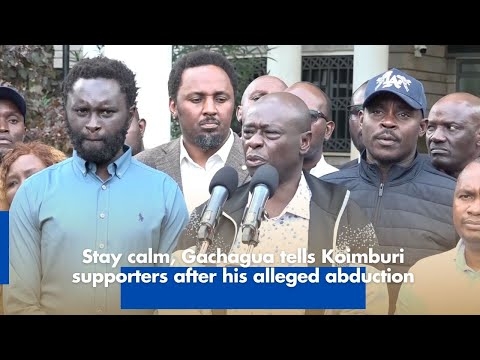

A High Court judge has dismissed a petition by lawyer Gathii Irungu seeking to stop his prosecution in a Sh10 million land row case linked to Juja Member of Parliament George Koimburi.
The ruling, delivered by Justice Lawrence Mugambi on August 13, 2025, allows the criminal case to proceed in the magistrate’s court.
The case stems from allegations that on or before March 26, 2020, Irungu, alongside Koimburi and another co-accused, Karungri Maina, conspired to defraud Julius Gitonga Githinji of a 1.310-hectare parcel of land in Ruiru/Juja East, valued at approximately Sh10 million.
The charge sheet alleges that the three accused, namely Koimburi, Karungri Maina, and Gathii Irungu, jointly with others not before the court, facilitated a fraudulent sale agreement executed without the landowner’s consent.
Irungu’s petition challenged the actions of the authorities, arguing that both the investigation and the decision to charge him were biased, lacked procedural fairness, and were intended to create a coercive environment that undermined his constitutional rights.
Based on the verdict read by the judge, Irungu insisted that he had no involvement in the sale agreement, which was alleged to have been prepared by one of his employees, Harrison Ndung’u, without his knowledge or instruction.
In an apparent letter to the authorities, Irungu further alleged that the employee had absconded in 2020, making it impossible for him to provide any further details, and that he had not received legal fees or records of payment related to the transaction.
“One of my staff, without permission or knowledge, executed the agreement. He absconded duty in 2020, and we are trying to trace him after we were informed he relocated to Gatundu,” the letter in the ruling stated.
During the proceedings, Justice Mugambi referenced the ongoing criminal trial, noting that Irungu contended the investigations were allegedly malicious and aimed at making him criminally liable for actions carried out by another person.
The advocate insisted that the only link between him and the alleged fraudulent transaction was that the agreement had been drafted at his law firm in Ruiru.
Irungu also stated that he had recorded a statement denying involvement in June 2020 but was nonetheless summoned in 2025 as the third accused in the criminal case.
“In September 2024, he (Gathii) claimed to have been summoned by the DCI, where the second interested party (Koimburi) was present. The second interested party claimed to have settled the matter with the first interested party, and that he (Gathii) would be called as a prosecution witness only on June 12, 2025, to be told that he was required to appear in court in a criminal case, as the third accused,” the ruling stated.
In its response, the DCI, through the investigating officer, detailed the sequence of investigations.
The complaint was said to have been initiated by the mother of the first interested party, Lucia Wanjiku Githinji, who alleged irregularities in the transfer of the property.
Investigators traced the land’s ownership and transfer history through the District Registrar in Ruiru, uncovering documents including green cards and daily presentation books.
The second and third interested parties claimed to have purchased the land from the owner, but the state found their evidence insufficient.
After reviewing the evidence, the DPP concluded that there were reasonable grounds to proceed with prosecution.
Justice Mugambi highlighted critical credibility issues concerning the petitioner.
The judge observed that Irungu provided only the name and phone number of the employee he alleged to have prepared the agreement without his authorisation.
“The petitioner only provides a name and phone number, yet he claims that this person or the suspect, was his employee. There is no evidence of his employment, letter of offer, professional details such as his admission number, assuming that the person was an advocate.
Or even details showing payment of salary, contract of employment… all he gives is a name and phone number, and then claims that person absconded duty in 2020,” the judge held.
The court noted that this omission led the investigator to doubt the petitioner’s sincerity, with the judge adding that Irungu appeared “elusive” during the investigation.
In its conclusion, the court emphasised that the issue of whether knowledge of participation can be attributed to the petitioner is a matter for the trial court.
“The trial court is the one that will determine whether or not knowledge of participation can be imputed on the petitioner, considering his conduct against the overall evidence presented before the court. That matter squarely lies in the trial court,” Justice Mugambi observed.
He further clarified that constitutional petitions cannot preemptively halt prosecutions unless there is clear evidence that the authorities acted in bad faith, with ulterior motives, or outside their statutory mandate.
“The likelihood of prosecution being unsuccessful is not a reason to consider it as unreasonable,” Justice Mugambi said, noting that interfering with the prosecution at this stage would constitute judicial overreach.
Ultimately, he ruled that the petitioner had failed to demonstrate that the respondents acted with malice or without reasonable grounds, therefore dismissing the petition with costs to the state.
The case now remains under the magistrate court’s jurisdiction, where the three accused will face trial over allegations of a land fraud.
















